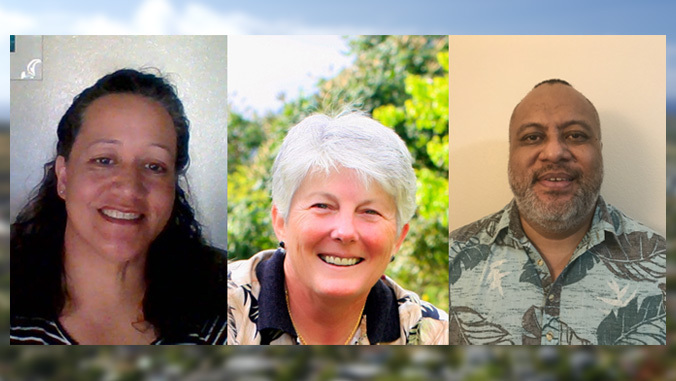
Program graduates from the University of Hawaiʻi–Hawaiʻi State Department of Health (UH–DOH) Contact Tracing Training Program have been providing critical outreach to communities throughout the state, especially those in Pacific Islander communities who were hardest hit in the state by the COVID-19 pandemic. Pacific Islanders make up about 4% of the state’s population, but have about 28% of the state’s coronavirus infections, according to DOH.
From June—October 2020, more than 500 individuals statewide have completed the UH–DOH program. Many serve on contact tracing teams for DOH or other organizations, in roles such as first callers, contact tracers or disease investigators, and play an important part in the state’s COVID-19 response. Under the leadership of Emily Roberson, DOH Disease Investigation Branch chief and Contact Tracing Program lead, contact tracing teams have been formed to focus on specific groups at highest risk, including Pacific Islanders.
“UH-trained members on our contact tracing teams have been critical to help us best reach Pacific Islander and other highly-impacted communities,” said Sarah Kemble, Acting State Epidemiologist. “We appreciate the ongoing partnership with our state university.”
Here are the stories of three contact tracers from the UH–DOH program currently working with these communities.
Chantelle Eseta Matagi (“Tellie”)
Matagi joined the third contact tracing training cohort offered by UH West Oʻahu after hearing about the program from mentor and friend, Tina Tauasosi-Posiulai, community partnership and research specialist at UH Mānoa’s Office of Multicultural Student Services-Pasefika Passion Pipeline. Actively involved with the Samoan and Pacific Islander communities around the island, Matagi was highly motivated to take the UH course. She is now the lead investigator for DOH’s newly formed Pacific Islanders Outreach Team.
“The UH training prepared me for the realities of being a lead investigator,” said Matagi. “This disease has affected Pacific communities due to socioeconomic disparities, inequitable access to a suitable standard of health care, language barriers and a lack of cultural competency. These factors require additional skills and thoughtfulness throughout the contact tracing process.”
Since October, she and her team of 10 have been filling an important void in educating Pacific community members about the virus. They perform contact tracing duties in languages such as Samoan, Marshallese, Chuukese, Yapese and three of eight Filipino dialects—Ilocano, Tagalog and Cebuano. The team hosts online COVID-19 educational seminars that are culturally sensitive and in the participant’s native language. According to Matagi, some people learn about the coronavirus and the role of contract tracers for the first-time during these presentations in their native language.
She added, “I love seeing the work my team does to make a positive impact on our Pacific communities. Making much needed wrap-around services accessible by offering it to them in their own languages will hopefully take the fear out of this process.”
Matagi earned her bachelor’s degree in Pacific Islands studies from UH Mānoa and is currently a master’s student at UH Mānoa’s Center for Pacific Islands Studies.
Elia Titiimaea
Titiimaea was part of the first contact tracing cohort offered by UH West Oʻahu for community health professionals. Upon completing the program in July, he was hired as a contact tracer by DOH and later promoted to contact investigator. Born in American Samoa, Titiimaea received his undergraduate training in biological anthropology from University of California-Los Angeles and received medical training at the Fiji School of Medicine. He later worked in both outpatient and inpatient care settings in American Samoa.
Titiimaea uses linguistically and/or culturally appropriate methods to perform his contact tracing responsibilities for Native Hawaiian Pacific Islander cases and contacts. Considered one of the team’s veteran members, he helps to train new staff in these areas. The UH training he received helped him to establish the rapport and trust needed from contacts who would otherwise be unwilling to provide him with information needed to stop the spread of COVID-19.
“[The training] made me aware of my lack of cultural knowledge about other cultures, but at the same time, it reinforced the utility of my own cultural intelligence in my ability to help those of the same culture,” said Titiimaea.
He hopes to continue his education to pursue a master of public health in health policy and management.
Teresa Parsons
Parsons was part of the first group that received training in the UH–DOH contact tracing program at UH Mānoa through the School of Nursing and Dental Hygiene (SONDH). She previously served with the Army Nurse Corps for 30 years and traveled around the world. Retired in 2011, Parsons worked part-time with SONDH and spearheaded a partnership with the U.S. Navy for faculty and graduate students to participate in military medical missions throughout the Pacific.
The emergence of the COVID-19 pandemic prompted Parsons to pursue training in contact tracing. She was later hired as a contact tracer with DOH and tapped to provide assistance at Kōkua Kalihi Valley because of the surge of cases in the community. Parsons is responsible for calling a patient and their family to complete the clinical assessment and makes follow-up calls to determine whether they need more medical support.
“I am filled with gratitude when a worried mother tells me she feels like she can manage the illnesses in her household or when someone is being released from the hospital after weeks in a COVID-19 unit. These events make it all worthwhile,” she said.
Parsons added, “Hearing someone tell you that you are positive for COVID-19 can be frightening in many ways, and the UH–DOH training gave an in-depth approach to the fine skills needed to talk with someone facing health and economic challenges.”
For more on the training program, email oshi@hawaii.edu or visit the website.
—By Arlene Abiang

